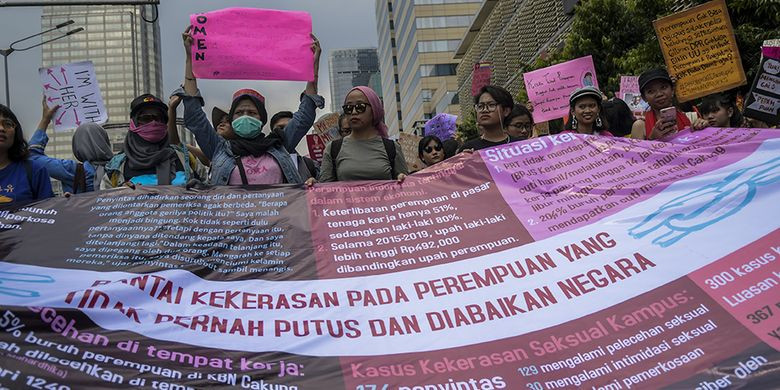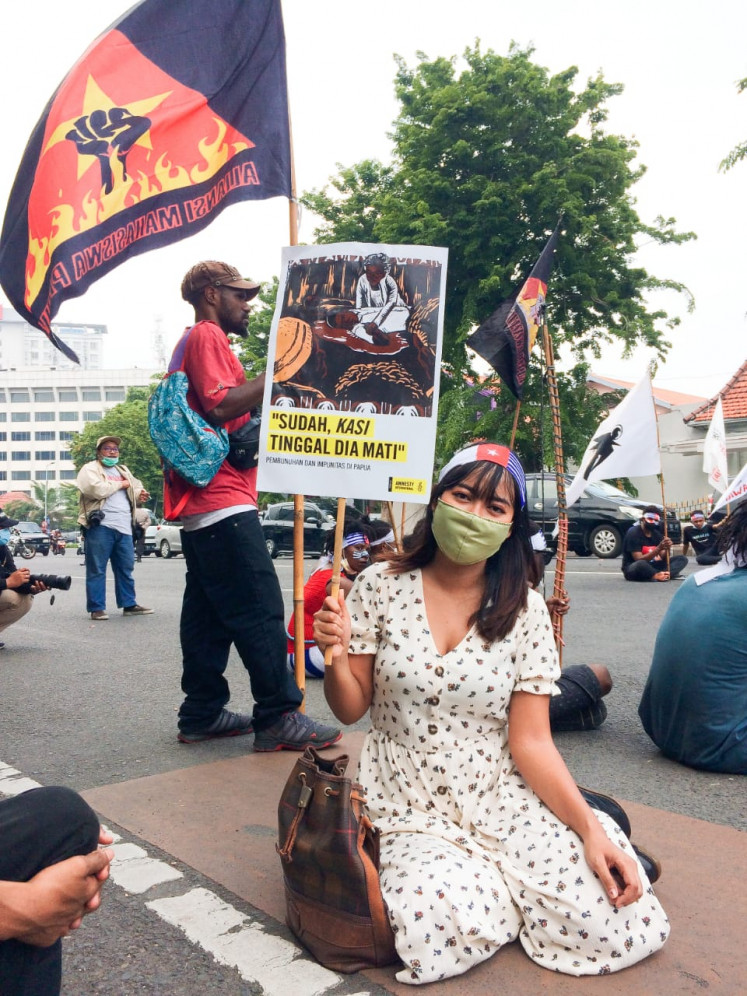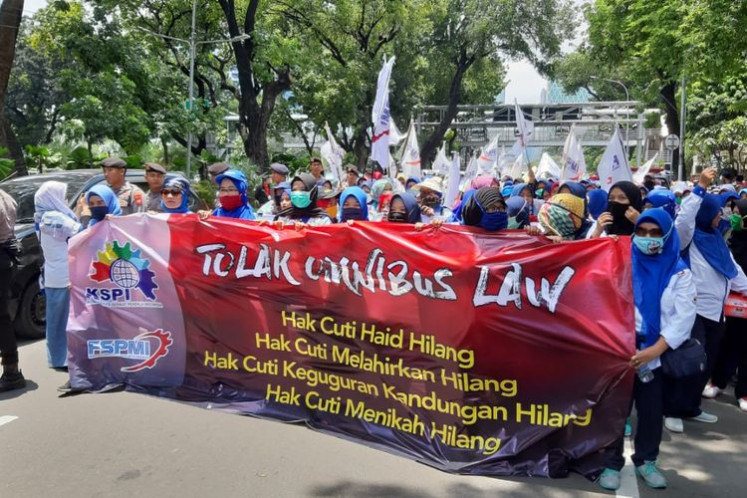Popular Reads
Top Results
Can't find what you're looking for?
View all search resultsPopular Reads
Top Results
Can't find what you're looking for?
View all search resultsFor Indonesian women threats persist amid a lack of protection
Indonesian women remain in a hazardous living environment where the law doesn't seem to protect them.
Change text size
Gift Premium Articles
to Anyone
"I am disappointed, but at this point, I don't really have any expectation nor faith," Anindya “Anin” Shabrina Prasetiyo said.
The 25-year old was a student activist sued for defamation under the controversial Electronic Information and Transactions (ITE) Law. This happened after she posted an account on Facebook alleging sexual harassment by police officers during an unauthorized raid on the Papua Student Alliance's weekly discussion in Surabaya, East Java, in 2018. In her post, she also mentioned reporting the harassment to Surabaya Police Internal Affairs, a report that was left unprocessed.
For Anin, being a sexual assault survivor is hard enough, but the criminalization by officials supposedly responsible for protecting victims such as herself after the case was reported was staggering. It was so traumatic that Anin was later diagnosed with post-traumatic stress disorder. It does not help that officers have paid visits to her home, under the guise of bringing her food and checking on her wellbeing. The case remains ongoing but Anin has refused to testify and remains under surveillance.
Anindya Shabrina attending political rally demanding to end killings and persecution against Papuans. (JP/Courtesy of Anindya Shabrina)"I had to go to a psychiatrist who prescribed me sedatives to reduce my anxiety and paranoia, [which is] triggered by small things such as hearing the sound of a police siren when I'm eating or driving,” she said
The event also affected her sphere of political activities. "At some point, I also felt like a hostage. Before the criminalization, I used to speak up and write openly on political issues. I don't have as much freedom since. Not to mention I'm still under surveillance."
"But if they want me to stay put by committing such repressive acts, I won't be silenced. My trauma does not equal surrender."
The missing safeguard and persistent risk
Although there has been an abundance of sexual harassment cases swirling in public demanding to be dealt with, the sexual violence eradication bill has yet to be passed. Similarly, a major outcry against the persistence of how the ITE Law has been abused to criminalize political opposition has been deafening. Still, the silence from the state is even more deafening—and threatening. The sexual violence bill has been in prolonged deliberation for years, the safety of women endangered with each wasted second. The threat of not only experiencing another assault but also of being criminalized under the ITE Law persists.
"As a woman who speaks up on political issues, I believe we are more prone to criminalization. A woman who's politically vocal in male-dominated politics is seen as an outlier and more susceptible to violence," Anin said.
It begins at home
The general population of working-class women is no exception to the vulnerabilities caused by the holes in our law. Fathimah Fildzah, who goes by her last name, a researcher at the National Institute of Science (LIPI), remembers the women workers' stories in her research projects vividly. One of them worked in a “putting out system”—a work-from-home system in which the machine was relocated to the worker's house. She produced branded sweaters with that machine.
"She claimed work-from-home was convenient because then she could also take care of her children," Fildzah recalled. "But in reality, she had to do all the work: as if the sweater-producing wasn't enough, she had to take care of the family and cook and make coffee and snacks for her husband while he was relaxing on the weekends. She also had to run the family’s small stall selling cheap snacks and drinks."
Women laborers on a political rally against Omnibus Law. Omnibus Law is a threat to their well-being by taking away paid leave for menstruation, pregnancy, childbirth, and miscarriage. (KSPI/Courtesy of KSPI)The unfair treatment of women often begins at home. A working woman is responsible for productive work and the reproductive tasks: taking care of children, managing the household and other domestic affairs. This reproductive duty produces a stigma where women are considered “extra-earners”, not the main breadwinner, which undermines women working as outsourced labor. They are treated as temporary workers who need to balance their work and family and are assumed to be relatively unproductive workers compared with their male counterparts.
"The Manpower Law regarding outsourcing heavily affects women workers," stressed Fildzah. "For women, outsourcing enforces the stigma of 'temporary' and 'not-so-productive' labor—placing outsourcing as the equitable solution for women who want to balance work and family—leaving them even more vulnerable to the loss of income as well as paid maternity and menstruation leave."
Fildzah was particularly concerned with the omnibus jobs law. "It allows time-and/or outcome-based pay, which is harmful to outsourced women with reproductive responsibilities: their productivity will always be perceived as inferior to men, both in time and outcome, putting them at risk of even lower pay than it already is."
Poor working conditions and alienation
In fact, women act as the breadwinner not only for the nuclear family but also for extended families. Fildzah was reminded of another story. "When I was involved in a factory occupation, I slept next to dozens of women workers who worked for the company for years: 10, 20 years, but they were paid way below the provincial minimum wage at the time, around Rp 1.8 million (US$124). Can you imagine, the low minimum wage wasn't even met?"
A young woman worker asked Fildzah how it felt to have a boyfriend, crying as she did so. It was a reminder of how alienated from ordinary life they were.
The small delights of life have turned into elusive matters for women workers who are burdened with the responsibility of feeding their family, stripped from the things that make us human by their poor living conditions and job insecurity. But their situation does not only arise from economic necessity—the heavy corporate exploitation and unprotecting state law are mostly responsible for the aggravated conditions of many women from the working poor, through the Manpower Law and Job Creation Law.
Wrong business to mind
While the law fails to protect working-class women by preserving traditional domestic gender roles, lawmakers have made questionable efforts to micromanage citizen's familial relationships through the proposed family resilience bill. Criticism of the bill has focused on how it reinforces patriarchal and heteronormative values that harm women and the gay and trans communities.
Living as a trans woman is a constant battle against prejudice and persecution in the intersection of misogyny and transphobia, often coming from their own families. Many trans women live with rejection and discrimination from their family, often resulting in being kicked out or having to escape abusive households. But as acts 85-89 of the bill originally regulated that "a family or a person with 'sexual perversion' shall report to the authority or a rehabilitation center for medication and/or therapy", the bill attempts to impose discriminative acts against non-heteronormative communities and especially trans women right down into the family unit.
Nathasya, a 34-year-old who only wants to use her first and chosen female name, for example, had to endure her father's abusive repression of her gender expression. "Although he supported my dancing talents, he never supported my transition to being a woman. He would beat me up for that. I was traumatized."
After her father's passing, she started sneaking behind her family to be an mangkal (escort) at night when they had fallen asleep, only to be caught by her mother. "After [my family] learned the truth, they didn't accept it. So, I had to move out of the house." Nathasya then began her journey to finding herself through many jobs: an escort, a drag performer, a model, and recently, she moved out to Bali and opened her own small beauty salon.
"We're just living our lives."
In order to find her own identity, Nathasya had to get out of her house and took many jobs. One of them that she finds joy is modelling. (Source's Instagram/Courtesy of instagram.com/nathasya.alma77)Nathasya sees the bill as a "way to curb us for our loudness."
As a trans woman, Nathasya does not hope for much. "I only wish for the state to be fair, not to mind our lives [...] I want us to be able to be accepted, have equal opportunity to work, and not live under constant threat and anxiety."
She noted the neglect from the state of her community's well-being. "We are not even given the right to claim any [state-subsidized] social aid, such as the Kartu Prakerja. They are distributed for 'normal' people only, and even if we want to claim, we have to claim it as our assigned gender identity registered in our ID."
"Our lives are hard enough already. We don't have the privilege to think of inconsequential matters,” she says, before adding “All I care about is that we can work, contribute to society, and be accepted."













